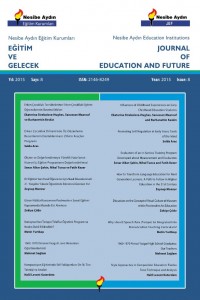Abstract
It is crucially important to follow up recent approaches in composition training. It is crucial to know; the meaning of twelve tone technique, how variety of forms are determined, how fret classes and sequence number are determines, how a series can be distinguished in a cluster, how all forms of series can be listed and how the position of forms of series in twelve tone composition education and analysis. Today, the Twelve Tone Technique still preserves its style in composition. Following the 1st World War, there happened advances almost in every field. Twelve Tone Technique, is amongst the manifesting trend in the field of music. When Schoenberg composed his first Twelve Tone piece in 1920 (Prelud; Op.21 Suit), this opened a new door into the 20th Century music. With this opening, chromatism was extensively used by composers. The use of Atonality or the feeding of non-tonal centered music with chromatic materials created the base of Twelve Tone Technique (TTT). Free Atonality revealed with extended use of Chromatism in early 1900’s and development of this technique in 1910 which can be termed as decent of tonal system. The methodology developed by Schoenberg used also this. There are several concepts within the structure of TTT. The most important structure of this system is the material of series. So called serie can be used at four different structure. Abbrevations and terminology used at TTT structure are termed as; Prime-P, Retrograde-R, Inversion –I, and Retrograde ınversion –RI. For each four scale, there are 12 transmission possibility. Thus, it is reached up to 48 scale. Basically, Twelve Tone study includes the presentation of scale forms with diversify.
Keywords: twelve tone, schoenberg, chromatism
Keywords
References
- Griffiths, P. (2010). Modern Music And After 3rd Edition, Oxford University, USA.
- Kostka, S. (2006). Materials and Techniques of Twentieth-Century Music 3rd Edition, Pearson Prentice Hall.
- Lester, J. (1989). Analytic Approaches to Twentieth-Century Music 4th Edition, W.W. Norton &Company.
- Özçelik, S. (2001). On İki Ton Besteleme Tekniği, (2001) G.Ü. Gazi Eğitim Fakültesi Dergisi, 21(3), 173-186.
- Sakpınar, M. (2002). Yirminci Yüzyıl Müziğinde Avant-Garde Ögeler
- Stone K. (1980). Music Notation in The Twentieth Century 1st Edition, W.W. Norton &Company.
- Salzman E. (2002). Twentieth – Century Music 4th Edition, Pearson Prentice Hall.
- E-Sources
- https://en.wikipedia.org/wiki/Twelvetone_techniquehttp://global.britannica.com/art/12-tone-music
- http://www.tufts.edu/~mdevoto/12TonePrimer.pdf
- http://musike.cmpr.edu/docs/v001/roman-eng.pdf
- http://www.clarkross.ca/480_12_Tone_Technique.pdf
Abstract
Bestecilik eğitiminde güncel yaklaşımları takip etmek çok önemlidir. On iki ton serisinin ne anlama geldiği, nasıl oluşturulduğu, ismi, çeşitli formlarının nasıl belirlendiği, perde sınıfları ve sıra numaralarının nasıl belirlendiği, bir kümedeki serinin ve seri formunun birbirinden nasıl ayırt edilebileceği, tüm seri formlarının nasıl listelenebileceği ve bir parçadaki seri ve seri formlarının konumlarının nasıl belirleneceği konuları on iki ton besteleme eğitiminde ve analizinde çok önemlidir.Günümüzde bile on iki ton tekniği tarzını koruyan bir stildir. Birinci Dünya Savaşının ardından dünyadaki gelişmeler her alanda kendini göstermiştir. Müzik alanında da on iki ton tekniği kendini gösteren akımlardan sadece biridir. Schoenberg 1921 yazında ilk on iki ton parçasını (Prelud; Op.21 Süit) bestelediğinde 20 yy. için çok büyük kapı açmıştır. Bu kapının açılmasını hazırlayan en büyük gelişme de müzikte kromatizmin büyük bir alanda ve besteciler tarafından kullanılmasıdır. Önceleri atonalite ya da herhangi bir ton merkezi olmayan müziklerin kromatik materyal ile bestelenmesi on iki ton tekniğinin zeminini oluşturmuştur. Tonal sistemin çöküşü olarak adlandırılan serbest atonalite kromatizm hakimiyetinin 1900 başlarında daha yoğun bir şekilde kulanılması ve 1910 yıllarına doğru geliştirilmesiyle ortaya çıkmıştır. Schoenberg’in geliştirdiği yöntem de bu yolda geliştirilmiştir. On iki ton sisteminin yapısında bulunan bazı kavramlar vardır. Bu sistemin en önemli yapısı dizi materyalidir. Söz konusu dizi dört farklı yapıda kullanılır. On iki ton yapısı analizinde kullanılan terimler ve kısaltmaları, Birincil dizi (Prime-P), Deriye Doğru Dizi (Retrograde-R), çevirme (Inversion –I), Geriye doğru çevirme (Retrograde ınversion –RI) şeklinde adlandırılır. Her dört dizi için 12 tane aktarım ihtimali bulunmaktadır. Bu şekilde 48 adet diziye varılır. Basitçe vurgulanırsa, on iki ton çalışması dizi formlarının çeşitlendirilirek sunumunu içerir
Keywords
References
- Griffiths, P. (2010). Modern Music And After 3rd Edition, Oxford University, USA.
- Kostka, S. (2006). Materials and Techniques of Twentieth-Century Music 3rd Edition, Pearson Prentice Hall.
- Lester, J. (1989). Analytic Approaches to Twentieth-Century Music 4th Edition, W.W. Norton &Company.
- Özçelik, S. (2001). On İki Ton Besteleme Tekniği, (2001) G.Ü. Gazi Eğitim Fakültesi Dergisi, 21(3), 173-186.
- Sakpınar, M. (2002). Yirminci Yüzyıl Müziğinde Avant-Garde Ögeler
- Stone K. (1980). Music Notation in The Twentieth Century 1st Edition, W.W. Norton &Company.
- Salzman E. (2002). Twentieth – Century Music 4th Edition, Pearson Prentice Hall.
- E-Sources
- https://en.wikipedia.org/wiki/Twelvetone_techniquehttp://global.britannica.com/art/12-tone-music
- http://www.tufts.edu/~mdevoto/12TonePrimer.pdf
- http://musike.cmpr.edu/docs/v001/roman-eng.pdf
- http://www.clarkross.ca/480_12_Tone_Technique.pdf
Details
| Primary Language | En |
|---|---|
| Journal Section | Makaleler |
| Authors | |
| Publication Date | July 24, 2015 |
| Published in Issue | Year 2015 Issue: 8 |
Cite
If necessary, you can send an e-mail to jef.editor@gmail.com to contact the editor-in-chief.


